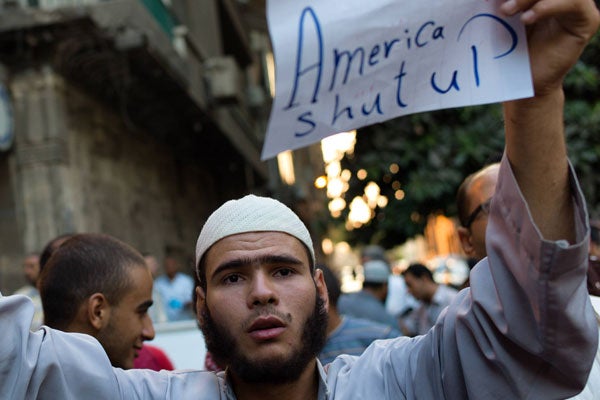Diplomats abroad represent the government of the United States. They must, therefore, speak with tact, but also with honesty. After all, most of the people they’re speaking to have no firsthand experience with the U.S. Our diplomats are teaching foreigners about America. In fact, the “primary purpose of United States public diplomacy is to explain, promote, and defend American principles to audiences abroad.”
So let’s consider the message our government sent with this statement that the American Embassy in Egypt put out on Tuesday: “The Embassy of the United States in Cairo condemns the continuing efforts by misguided individuals to hurt the religious feelings of Muslims—as we condemn efforts to offend believers of all religions.”
It was speaking out against a low-budget film that has apparently been screened only once, to an audience of about a dozen people, clips of which have circulated online. The embassy seems to have been attempting to reduce tensions in the region. That obviously didn’t work, as a mob soon stormed the embassy compound anyway.
The bigger problem is that the embassy statement makes it seem as though the U.S. government is taking an official position that it opposes speech that may “offend believers” of a particular faith (of course, speech that one person finds offensive, another will consider banal). The State Department backed away from that claim after the attack. “The statement by Embassy Cairo was not cleared by Washington and does not reflect the views of the United States government,” an official said. But it was too late. Americans understand that our government doesn’t have the authority to ban offensive speech. But foreign people may not be aware of that.
For example, after the attack Egypt’s prime minister, Hisham Kandil, announced: “We ask the American government to take a firm position toward this film’s producers within the framework of international charters that criminalize acts that stir strife on the basis of race, color or religion.”
Except that the First Amendment protection of free speech overrides any such “international charters.” The producers of the film have the right to be offensive, if they so desire, as much as we ourselves may not like it. For his part, Egyptian President Mohamed Morsi “condemned the transgression upon the prophet and ordered the Egyptian Embassy in Washington to take appropriate legal measures against the producers of the film.”
Again, there are simply no “legal measures” to take. Our government doesn’t control American filmmakers.
The confusion is understandable. Egypt’s government may well have the power to take legal action against filmmakers, and Egyptians may well assume the American government does as well. It’s up to our embassies to remind publics overseas that our government’s authority over filmmakers (and writers, and orators) is rightly limited.
Our government isn’t responsible for the content of movies made, books written, or blogs posted by Americans. Nor should it condemn or condone the content of free speech. That’s a complicated message, but one that foreigners need to hear again and again.





















